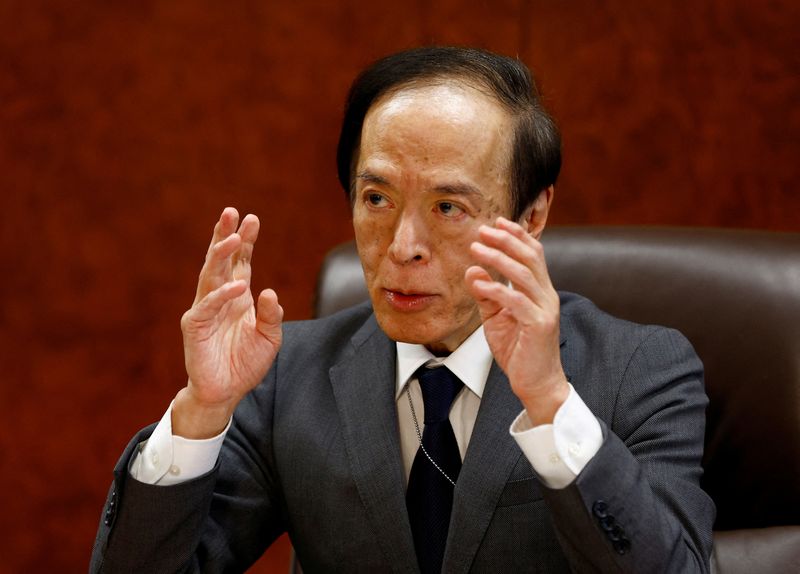By Leika Kihara and Tetsushi Kajimoto
TOKYO (Reuters) -The Bank of Japan maintained its ultra-easy monetary policy on Friday despite stronger-than-expected inflation, signalling it will remain a dovish outlier among global central banks and focus on supporting a fragile economic recovery.
The central bank also reiterated its view that inflation will slow later this year and a pledge to "patiently" sustain stimulus, suggesting its desire to wait until there is clarity on whether more demand-driven, durable price rise will take hold.
"We expect trend inflation to heighten as economic activity strengthens and the labour market tightens. But there's very high uncertainty on next year's wage negotiations and the sustainability of wage growth," Governor Kazuo Ueda told a briefing.
But with inflation exceeding the BOJ's 2% target for over a year and analysts casting doubt on its view the recent cost-push price rises are transitory, Ueda left room for a possible policy shift by dropping warnings on inflation risks.
"At present, inflation has exceeded 2% for 13 straight months but could fall below that level ahead. That's why we are not normalising monetary policy. But if that view changes sharply, we will have to change policy," he said.
The remark could keep alive market expectations that the BOJ could tweak its controversial bond yield curve control policy as early as next month, when it issues fresh quarterly growth and inflation projections.
As widely expected, the BOJ maintained its -0.1% short-term interest rate target and a 0% cap on the 10-year bond yield set under its yield curve control (YCC) policy.
The BOJ's decision contrasts sharply with that of the European Central Bank, which raised borrowing costs to a 22-year high on Thursday. The U.S. Federal Reserve on Wednesday also signalled it was not yet done with its fight against inflation.
The yen fell broadly following the BOJ's announcement, hitting a fresh 15-year low of 153.97 per euro and sliding 0.25% at 140.66 to the dollar.
The benchmark 10-year Japanese government bond yield briefly fell to 0.4% after the decision, well off the implicit 0.5% cap set for the maturity.
NOT ENTIRELY DOVISH
Core consumer inflation hit 3.4% in April as rising raw material costs prodded firms to hike prices. Companies also offered pay hikes unseen in three decades this year, heightening prospects of an end to decades of deflation.
In a sign of its growing optimism over the wage outlook, the BOJ upgraded its view on job and income conditions to say they are "increasing moderately."
In a statement announcing the policy decision, the BOJ said it expects core consumer inflation to moderate toward the middle of the current fiscal year ending in March 2024 due to falling fuel and global commodity prices.
But analysts still expect the BOJ to revise up in July this fiscal year's inflation forecast from the 1.8% projection made three months ago, as companies hike prices more aggressively than initially expected.
While sticking to his view cost-push inflation will slow in coming months, Ueda acknowledged that inflation was not moderating as quickly as initially thought as companies continue to hike prices.
However, he said an upward revision to its inflation forecasts alone would not automatically trigger a policy shift, as what was important was "not just the median projection but the degree of certainty about the estimates."
While Ueda maintained his dovish tone overall, he suggested that the side-effects of its yield control programme, such as market distortions caused by its heavy-handed defence of the yield cap, could be among triggers for a policy tweak.
"We've seen the side-effects of YCC subside recently. As for what we will do will depend on how we see the balance between the merits of maintaining YCC, and the demerits," he said, when asked whether raising the yield cap remained a policy option.
The yen's recent decline could also heighten calls from politicians for the BOJ to tweak YCC, as it squeezes households and retailers by pushing up raw material import costs.
"The BOJ is not in a hurry to tweak policy on the view the side-effects of YCC aren't so large," said Izuru Kato, chief economist at Totan Research.
"But it may be forced to act if the yen weakens further and drives up import costs, angering the public. The trigger for a YCC shift could be a sharp yen fall."
